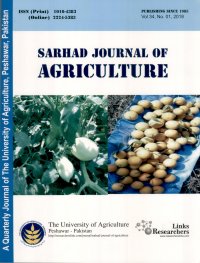Exploring the Economic Implications of IoT Adoption in Agriculture: A Cost-Benefit Study in Jazan, Saudi Arabia
Exploring the Economic Implications of IoT Adoption in Agriculture: A Cost-Benefit Study in Jazan, Saudi Arabia
Yonis Gulzar1*, Faheem Ahmad Reegu2, Arjumand Bano Soomro1,3, Mohammad Shuaib Mir1, Abdul Zahir4* and Choo Wou Onn5
ABSTRACT
This study examines the economic implications of IoT adoption in agriculture, highlighting significant positive correlations between IoT knowledge, smart irrigation techniques, and economic outcomes among farmers in Jazan. The results show that IoT technologies substantially improve farmers’ resource efficiency, productivity, and sustainability for farmers, supporting the adoption of IoT solutions in the agricultural sector. Also, the study explores the potential economic impact of the adoption of Internet of Things technology in the agricultural sector, focusing on Jizan in Saudi Arabia and subsequently on Knowledge and Awareness of the Internet of Things, Smart Irrigation Techniques, and Benefits and Economic Outcomes, and consequently, how these factors influence the adoption of Internet of things technologies among local farmers. The results of the study show that farmers’ knowledge and awareness of IoT technology and their willingness to adopt Internet of Things technologies have a significant positive correlation, which supports the first hypothesis. A second hypothesis that has been affirmed by this study is that the adoption of Smart Irrigation Techniques and the adoption of the Internet of Things are closely linked. IoT is becoming increasingly important to farmers who implement smart irrigation practices, which is reflected in their tendency to integrate IoT technologies into their agricultural operations as well. Accordingly, a third hypothesis is substantiated, which asserts that perceived benefits and economic outcomes of IoT adoption are the driving factors for the adoption of IoT. There is a strong tendency for farmers to embrace IoT technologies when they perceive substantial economic gains that can be obtained through their implementation. In Jizan’s agricultural sector, these results highlight the economic rationale behind the adoption of IoT, emphasizing the importance of knowledge, sustainable practices, and incentives as primary drivers of IoT adoption. IoT adoption in the region has been described as a dynamic process, and this study contributes valuable insights into how IoT adoption is evolving within the region, offering implications for policymakers, agricultural stakeholders, and future research projects.
To share on other social networks, click on any share button. What are these?








